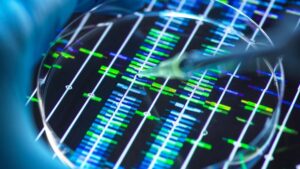Rhythm Biosciences moves closer to early colon cancer detection after successful tests

Pic: Luis Alvarez / DigitalVision via Getty Images
Special report: Leading biotech Rhythm Biosciences has passed a crucial phase in the development of an improved colon cancer blood test after four new test preparations successfully came through initial screening.
Rhythm Bio (ASX:RHY) is working to develop a simple, easy-to-use blood test for colorectal cancer. It’s a critically important project because not enough people are undergoing screening early enough to find out if they have the disease.
Fewer than half of colorectal cancers are diagnosed at early stages when it is most curable, according to government data.
At the moment, Rhythm is working with CSIRO scientists to develop new antibody reagents for the “ColoSTAT” test, which uses antibodies to measure the levels of several proteins in the blood.
Antibodies are recruited by the immune system to identify and neutralise foreign objects like bacteria and viruses.
The discovery that identified the patented colorectal cancer blood protein biomarkers used reagents that could only be used in research labs — but Rhythm needed to develop its own reagents for commercial purposes.
Part of the reason for Rhythm’s $9 million IPO in December was to fund this stage of the ColoSTAT test.
The concentrations of these target proteins have been shown to vary in the presence or absence of colorectal cancer.
When those values are run through a proprietary algorithm, the results are measured relative to a risk threshold which doctors can use to tell patients whether they need more testing or are safe for now.
“Four independent mixed monoclonal antibody preparations have now been identified that pass all three preliminary screening tests,” the company said.
“Successful completion of preliminary screening has triggered the next phase of key reagent development – the cloning of cells that produce the antibodies with the desired specificities.
- Bookmark this link for small cap breaking news
- Discuss small cap news in our Facebook group
- Follow us on Facebook or Twitter
- Subscribe to our daily newsletter
The cloning step is critical because that will ensure Rhythm can reliably supply these reagents for its diagnostic test in the long term.
Cloning has now started as part of the Rhythm’s reagent development program with CSIRO and they’ll expect to know if it’s successful by the end of June.
After detailed characterisation of the monoclonal antibodies and the cloned cell lines that produce them, the scaling up of antibody production can begin.
“Rhythm’s key focus for the coming months is to secure our own antibodies and target proteins to give us control of the supply, quality and cost of these key reagents,” said Rhythm managing director Dr Trevor Lockett.
“Confirmation that we have antibodies that pass all three pre-screening tests in four of our mixed antibody populations is excellent news for our product development program.”
This special report is brought to you by Rhythm Biosciences.
This advice has been prepared without taking into account your objectives, financial situation or needs. You should, therefore, consider the appropriateness of the advice, in light of your own objectives, financial situation or needs, before acting on the advice.
If this advice relates to the acquisition, or possible acquisition, of a particular financial product, the recipient should obtain a disclosure document, a Product Disclosure Statement or an offer document (PDS) relating to the product and consider the PDS before making any decision about whether to acquire the product.
UNLOCK INSIGHTS
Discover the untold stories of emerging ASX stocks.
Daily news and expert analysis, it's free to subscribe.
By proceeding, you confirm you understand that we handle personal information in accordance with our Privacy Policy.








